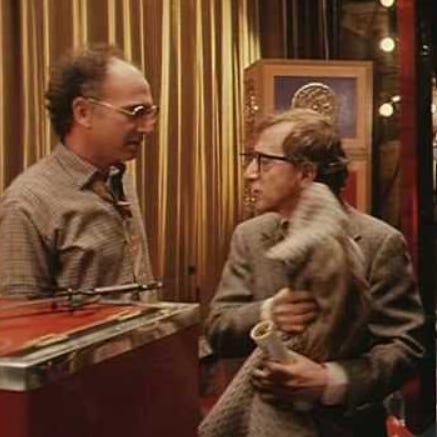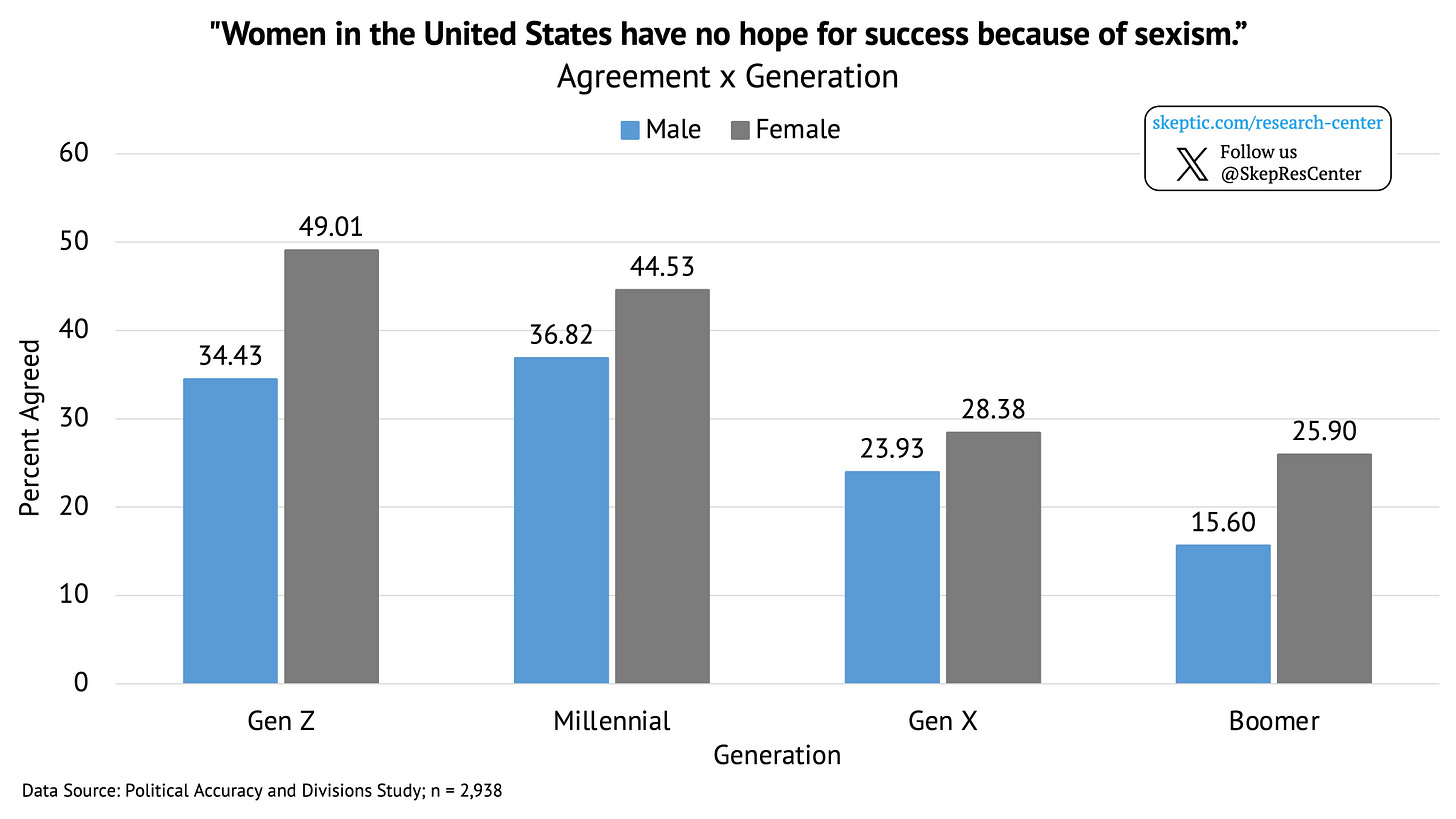liberals aren't crazy — they're neurotic!
Are Liberals Crazy? Part II: neuroticism and conscientiousness.
Leftism correlates with neuroticism, but not with conscientiousness. In Part II of this 13,000 word, 13-Part series, Are Liberals Crazy?, we introduce and distinguish neuroticism and conscientiousness.
What is neuroticism?
The term neuroticism is colloquially associated with worry, anxiety, or undue concern. Did I leave the oven on? In the popular imagination, a neurotic man is paranoid about how others perceive him; he overanalyzes and overthinks; he tortures himself with pessimism and the worst possible outcomes.
These stereotypes, based in Jewish humor, have limited the term “neurotic” to specifically mean “the type of intellect which is so overly active that it results in perpetual fear and worry.” But this is a false correlation: intelligence is negatively correlated to neuroticism.
The scientific definition of neuroticism is simply “heightened negative affect.” It does not require intelligence. In fact, people with lower intelligence are more likely to be neurotic.
Negative affect includes any negative emotion, such as:
irritation, sadness, anger, rage, jealousy, frustration, worry, anxiety, suspicion, annoyance, impatience, pity, fear, nervousness, guilt, shame, despair, loneliness, regret, embarrassment, humiliation, contempt, grief, hatred, disappointment, hopelessness, resentment, insecurity, loathing, dread, or helplessness.
Neuroticism might express itself in an introverted way, through:
self-isolation, avoidant behavior, shyness, or quietness.
Or, neuroticism can express itself in an extroverted way:
complaining, nagging, confrontation, arguing, criticizing, seeking constant reassurance, provoking fights, over-sharing, attention-seeking, melodrama, impulsive reactions, rudeness and interrupting, intentionally violating social or personal boundaries, mood swings, neediness, exaggeration and pathological lying, and blaming or scapegoating others.

What is conscientiousness?
Conscientiousness overlaps with perfectionism, Type-A personality, diligence, and cautiousness. People who are conscientious work hard to fulfill social expectations even when it “doesn’t matter” or no one is watching. For example, a conscientious person will tend to strive for straight As, even when there is no practical difference in outcome for getting 100% vs. 90%.
Conscientious people tend to show up early; they are meticulous and careful; they are respectful and polite; they follow rules and regulations; they are people-pleasers.
By contrast, highly neurotic people tend to be procrastinators; they miss deadlines; they have irregular sleep schedules due to serotonin deprivation; they find it difficult to focus on one task for a long time, or maintain motivation in the face of constant negative affect. When they fail to meet basic standards, they blame external circumstances, their parents, their childhood, capitalism, or God.
combining conscientiousness and neuroticism:
Despite these differences, there are cases where neuroticism and conscientiousness seem to be correlated: “I am a conscientious perfectionist, therefore, I neurotically worry about how others perceive me.” This perception is has a basis in reality, but only within individuals, not at the collective level between individuals:
While conscientiousness and neuroticism were negatively correlated at the between-person level, this relationship was reversed at the within-person level.1
The expression of personality traits are subject to variation over time. When you wake up in the morning, you may feel grumpy, irritable, or sexually aroused (this is when testosterone levels are highest). Before you go to sleep at night, you may become anxious and worried (when testosterone levels are low). When you see an attractive woman, you may become nervous and self-conscious. But after having sex, you may feel confident and relaxed.
Changes in external environment distort, suppress, or amplify existing personality traits. Personality is not a static monolith, but a probability field. When we say, “this person is depressed,” we don’t mean that they are sad every waking moment, but that they tend toward depression more than average.
As conscientiousness within a person increases (because of an impending deadline or motivation), neuroticism also increases. However, baseline neuroticism and baseline conscientiousness are negatively correlated when we compare two different individuals.
Leftism and Neurotic Scapegoating.
Most people who are neurotic have below-average conscientiousness. They might have beliefs like, “why bother trying? Everyone is out to get me anyway. No matter what I do, it always fails. Forces outside my control are sabotaging me.” These neurotic and low-conscientiousness beliefs are correlated with depression.
This informs the economic beliefs of leftists, who believe that capitalism is an unfair, parasitic, rigged game that is built to fail. For example, leftists are more likely to believe that homelessness people are forced to be homeless as a result of a capitalist conspiracy, rather than as a result of bad decisions or genetic diseases. As a result, leftists are more likely to promote authoritarian and collectivist reforms.
On the other hand, those who have low neuroticism and high conscientiousness are more likely to believe “I can do anything if I put my mind to it. The world is full of opportunity.” Conservatives see attempts to change the system as threatening, while leftists embrace large-scale systematic changes. This applies as much to religion, race, and gender as it does to economics, and amplifies the left-right divide in openness.
neuroticism is a strategy, not a disease.
Before conservatives jump to the conclusion that neuroticism is the worst thing ever, when neuroticism is combined with conscientiousness, this seems to be a superpower which leads to lower levels of chronic inflammation. This might be because these “conscientiously neurotic” people worry more about the future, and that includes the health effects of drugs, alcohol, and obesity.
Neurotics who are low in conscientiousness may cope with emotional instability by overeating and abusing drugs and alcohol. But “conscientious neurotics” may adopt a diet like veganism, vegetarianism, carnivore, keto, or Ray Peat. These different diets are contradictory, but they all require some level of worry or concern about health. General concern over health is correlated with better overall health outcomes.
Diet fanatics wander the grocery store checking all the ingredient labels for seed oils and preservatives. If they find a wrong ingredient, they feel an inner twinge of negative emotion which forces them to put the tasty (but potentially harmful) food back on the shelf. This might sound insane, but it does produce better health outcomes than absentmindedly stuffing your face with Sweet Baby Rays.
Diet and exercise is associated with conscientiousness, because the attempt is to conform to standards of normalcy. But unusual, unique, or fad diets which create difficulties in restaurants are more likely to be associated with neuroticism. Conscientious people diet in order to conform to a norm; neurotic people diet in order to meet some moralistic or aesthetic ideal.

Combining neuroticism together with conscientiousness creates maximum moralistic pressure. In other words, a highly conscientious and neurotic person is optimized for performance within high-stress collectivistic social orders, like an ethnically or sexually diverse workplace. Neurotic people are built to deal with the constant low-grade stress of domestic life — women tend to be more neurotic. This isn’t a disease, but an adaptation. People who are low in neuroticism “keep cool” under high-stress situations, which is useful in firefighting or police work, but not as useful in a daycare or a call center.

Since neuroticism and conscientiousness are inversely correlated, how would we select for individuals who are high in both? The answer is leftist academia, which selects for highly neurotic individuals, but also highly conscientious individuals. This is the ultimate prosocial personality type — the same one selected in European monasteries and cathedral schools during the medieval period. Derisively referred to as “the bug man,” the neurotic-conscientious combination is optimized for rule following in complex (multi-identity) religious orders. This is the priest class.
Conclusion.
The inverse correlation between conscientiousness and neuroticism holds when comparing individuals, but it doesn’t hold at the level of populations. White people tend to be more neurotic and more conscientious than black or Hispanic populations. Asians are more conscientious and less neurotic than whites.
When we control for intelligence, whites and Jews are the most neurotic populations on the planet. The fact that leftists are more neurotic than conservatives indicates that there is a unique connection between the white and Jewish deviation in personality traits and the leftist personality type.
In Part III, we will begin to explore “Neuroticism as a Group Evolutionary Strategy.” This is one you will not want to miss. Subscribe to stay tuned.
2010: It depends how you look at it: On the relationship between neuroticism and conscientiousness at the within- and the between-person levels of analysis: sciencedirect.com/science/article/abs/pii/S009265661000108X








If someone in the laboratory wanted to construct the biggest turd in the punch bowl, we'd start with high neuroticism and conscientiousness, and then max out disagreeableness, extraversion, and closedness to experience. The result would look something like Bill O'Reilly lol
No matter how hard you try to be dispassionate, you analysis makes me dislike leftists even more.
Also, Ozempic seems to work by doing three things. First, it slows gastric emptying. Without surgery. Second, it sends the “I’m full” signal to the brain. Third, it seems to dull the excessive reward some people get from eating, particularly processed junk food. This last is why it shows some promise in treating addiction. It doesn’t increase conscientiousness or willpower; it renders those attributes less necessary. People actually want to eat less. Hence, the moral argument against GLP-1 agonists. Which I don’t personally find compelling.